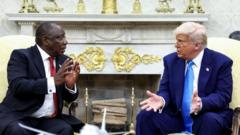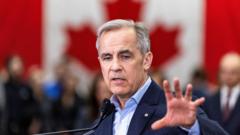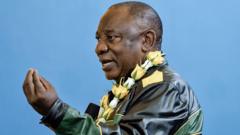As the new Canadian government settles in, Alberta's frustrations over resource management and taxation reignite separatist sentiments.
**Alberta's Bold Referendum: A Move Toward Secession from Canada?**

**Alberta's Bold Referendum: A Move Toward Secession from Canada?**
Alberta, often called "Canada's Texas," is proposing a referendum to explore breaking away from Canada amid political unrest.
In a striking development in Canadian politics, Alberta, a predominantly conservative province, is contemplating a referendum aimed at gauging public support for secession from Canada. This move emerges as the nation attempts to regain stability under a new prime minister following a period marked by heightened political turbulence and international pressures, notably under the Trump administration.
The proposed referendum highlights a deep-seated frustration among residents of Alberta regarding their perceived marginalization in the federal structure. Many in Alberta feel that the federal government unfairly restricts the province's ability to optimize its rich oil and gas resources, while also demanding significant tax contributions. This sentiment has fueled conversations about the province's future, with some Albertans even expressing desires to become a state in the U.S. rather than remain within Canada.
Historical parallels can be drawn with Quebec's secessionist movements, which, although previously significant, have lost momentum in recent years following the failure of their last referendum in 1995. In contrast, Alberta's current separatist fervor seems to be gaining traction, amplified by rising anti-federal sentiments after the Liberal government's re-election, perceived as unresponsive to Alberta's concerns, further complicating the already contentious political landscape.
Despite the unlikelihood of a successful secession—Canada's constitution would require major amendments—the very proposal of a referendum underscores the existing dissatisfaction in Alberta. As the province embarks on this unprecedented political journey, the voices advocating for separation continue to resonate within its borders, marking a notable chapter in Canada's ongoing narrative of federalism and regional identity.
The proposed referendum highlights a deep-seated frustration among residents of Alberta regarding their perceived marginalization in the federal structure. Many in Alberta feel that the federal government unfairly restricts the province's ability to optimize its rich oil and gas resources, while also demanding significant tax contributions. This sentiment has fueled conversations about the province's future, with some Albertans even expressing desires to become a state in the U.S. rather than remain within Canada.
Historical parallels can be drawn with Quebec's secessionist movements, which, although previously significant, have lost momentum in recent years following the failure of their last referendum in 1995. In contrast, Alberta's current separatist fervor seems to be gaining traction, amplified by rising anti-federal sentiments after the Liberal government's re-election, perceived as unresponsive to Alberta's concerns, further complicating the already contentious political landscape.
Despite the unlikelihood of a successful secession—Canada's constitution would require major amendments—the very proposal of a referendum underscores the existing dissatisfaction in Alberta. As the province embarks on this unprecedented political journey, the voices advocating for separation continue to resonate within its borders, marking a notable chapter in Canada's ongoing narrative of federalism and regional identity.





















